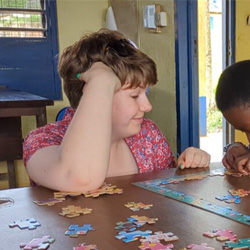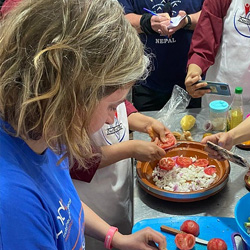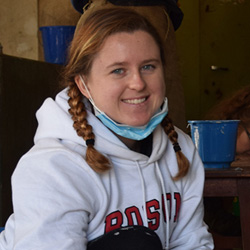Tips for travelling as a D/deaf person
The tips for travelling as a D/deaf person given below are written by a deaf person who uses cochlear implants and has been on VoluntEars trips to Sri Lanka, Ghana and Morocco.
While researching the tips below, she also asked other D/deaf people for their tips for travelling when D/deaf. Different things work for different people, we all have our own preferences for what to pack, how to communicate, what to bag to use, fold or roll clothes etc – there’s usually no right or wrong, so the list below is simply to help share ideas.
Packing
Check the VoluntEars Kit list for your destination and make sure you have everything they recommend.
Cleaning supplies (soft bristles/wipes) for hearing aids/cochlear implants.
Bring a dry box for cochlear implants that need it, in case it’s humid where we’ll be. If you don’t have one, you can also use a ziplock bag with dry rice inside – that absorbs moisture. I used to need this but now I only have a waterproof one, so I just use my waterproof case and take an extra waterproof battery. I need to charge it each night, but if I can’t or if the batteries won’t work for some reason (like after long flights), I know I’ll be with VoluntEars where communication isn’t a barrier. They know many of us are D(d)eaf and have different abilities to hear. I experienced this situation after landing in Ghana, and VoluntEars staff were able to sign and write for me, point, etc, it was not so awkward. It was easier than I imagined.
Charger for the cochlear implants.
Extra battery(ies) for the cochlear implants / hearing aids. Disposable if possible, or rechargeable. There were usually power supplies / outlets for us to charge them overnight. VoluntEars told us before the trip.
Plug adaptors – the plugs / outlets will be different in different countries, and you may need to charge your phone or hearing device / other devices. Research the countries to see which kind of plugs they use and what they look like. Try to buy adapters before travelling to save time / stress trying to find them after arriving abroad.
General travel tips for D/deaf people
Research where you’ll be going – the climate (will it be humid or dry?), the culture, possible hazards. On some trips, there may be opportunities to swim; will you wear your hearing aids or cochlear implants in the water, or not? I did not because even my waterproof cochlear implant will become muffled when water gets on the microphone, so I left it off when swimming.
Remember do not put a cochlear implant processor through the security belt and leave it on your head or hold it in your hand when crossing through the scanners in the airport (my audiologist said it might reset the program the processor is set to). Don’t walk through a magnetic scanner (make sure they know you have metal under your skin when going through security – most are fine, but some will need you to go around and they will pat you down.
Some airports will have hearing loops systems. You can ask at the information desk to make a note on your boarding pass that you’re deaf, and when you reach your gate you can board first (most airports allow this since you won’t likely hear them call your gate). When I joined the VoluntEars Morocco trip, my partner also joined the trip and helped as my “caregiver” in some situations when travelling.
Some airports will also allow you to use a wheelchair for being deaf (I don’t know why!), it can help to be pushed if it’s a long walk to your gate and you can skip long lines if you have an airport wheelchair. I personally also have mobility impairment and my deaf friends also use the airport wheelchair. It also helps if the person pushing your wheelchair will be able to interpret for you.
Some people like to travel with others to the destination. Ask VoluntEars which flights other people are taking and see if you can meet each other at the airport for at least part of the trip. That can be nice when embarking on a new adventure. It’s also fun seeing each other on the flight and arriving together and experiencing a foreign airport with each other. It can help overcome any nerves.
Local Culture
Don’t be afraid to ask someone to repeat or write information when you need it. It will be especially important when getting directions and instructions or checking the plans for each day. VoluntEars works really hard to ensure all the trips are fully inclusive so just tell them any time you need more explanation or assistance understanding something.
If you’re travelling independently (like you have extra travel time after the VoluntEars trip) you may find some local people won’t write, then it helps to point at things or try acting.
Email yourself or your family a copy of important documents in case any original ones get lost (passport, flight e-tickets, maps, etc). If you lose your passport, it’s much easier to replace if you have a photo of your old one.
Don’t rely on your phone because there may not be any signal where you’ll be. GPS may not work.
Buy a local SIM card if you always want to have a data connection because wifi may not be reliable or available at your accommodation.
Another tip for travelling as a D/deaf person is try to learn a few useful local signs and words before the trip. You might use them when ordering food on a menu etc.
Walk against traffic so you can see vehicles before they get close to you. Traffic rules might be very different to what you’re used to back home!
Try to spend time getting to know your fellow volunteers to find communication methods that work for you together.
Try and get to know the kids and staff at the deaf schools you volunteer at on the VoluntEars trip. It’s interesting learning about local deaf culture from them.
Communicating with local people outside of the school will also give you a taste of the surrounding culture.
It’s more important to ask questions when you’re not sure about things in another country, because safety is a priority when traveling. That’s also why bonding with your fellow volunteers will be helpful.
Overall
Most of all, in addition to being safe, enjoy your time abroad! Have a sense of humor when you make mistakes, it makes more of a difference when we’re vulnerable. If you’re deaf and hear the wrong information, your realisation and how you respond to it can change everything. Will you feel frustrated and helpless? Or will you laugh and know this mistake will make for great stories to tell later? We hope this helps your next adventure! 🙂
If you’re interested in travelling to Asia, Africa or Latin America, you can find out more about VoluntEars trips here.
Got a question? Contact us now!
Reviews
Next Steps










